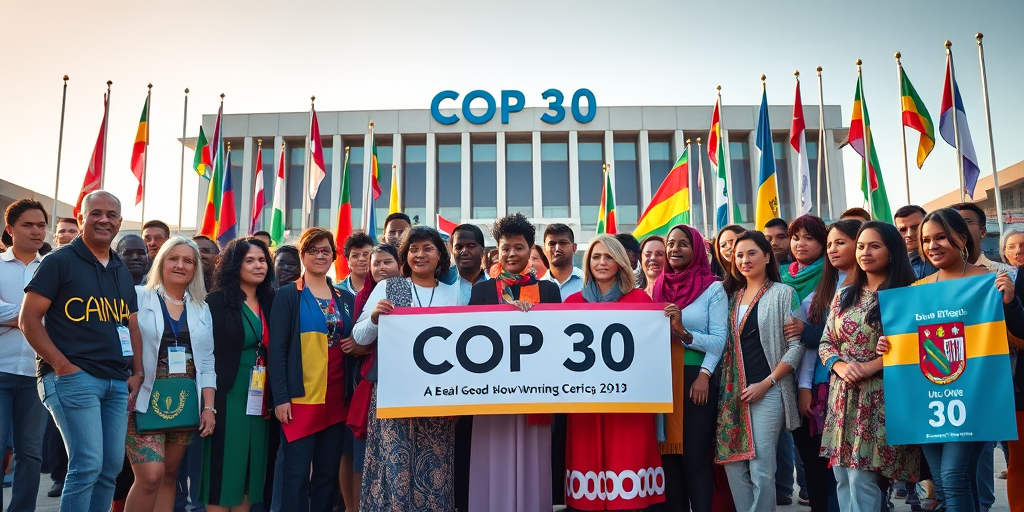EU Champions Gender Equality and Inclusive Climate Action at COP30
On November 10, 2025, a global call for gender equality and climate action took center stage during COP30 as the European Union (EU) and its Member States led a coalition endorsing the Global Statement on Gender Equality and Climate Action. This significant move reaffirms an international commitment to weaving gender equality into every thread of climate action, illustrating a transformative step towards addressing the vulnerabilities and potentials of women and girls in the face of climate change.
A Collective Call to Action
The newly endorsed statement brings with it a comprehensive strategy to integrate gender perspectives into climate policies in a meaningful way. Emphasizing the disproportionate climate risks that women and girls face, it highlights their immense potential as pivotal change agents in driving innovative climate solutions. Notably, this comes with a push for a robust Gender Action Plan at COP30, aiming to mend existing gaps and ensure inclusive participation of women, especially those from indigenous and local communities, in climate action initiatives.
Diana Acconcia, Director for International Climate Strategy at the European Commission, underscored the importance of this development. “Gender equality is not a side issue. It is central to effective climate action. At COP30, a new Gender Action Plan is essential to fostering real change and enabling women-led contributions to our climate goals,” she emphasized.
A Local Lens: Impact on American Communities
While the focus is on global diplomacy, the ripple effects of these initiatives are expected to resonate within American communities, particularly among those striving for equitable climate solutions. For residents of states like California or Florida, which face severe climate threats, the integration of gender-sensitive approaches could enrich local climate action plans, making them more comprehensive and inclusive.
Amanda Martinez, an environmental activist from Florida, remarked, “By acknowledging the intersectionality of climate impacts and gender, we’re not just addressing environmental issues—we’re uplifting entire communities that have historically been sidelined. This offers us a chance to craft more effective, just policies that reflect the needs of all residents.”
Historical Context and Community Connections
The call for gender-responsive climate action harks back to longstanding debates over equitable resource distribution and recognition of marginalized voices in climate dialogues. In communities across the U.S., there have been grassroots efforts advocating for policies that consider the intersection of gender, race, and socio-economic status in environmental impact assessments.
This new EU-led initiative is seen as a complement and strengthening of those local efforts, enhancing the capacity of communities to collaborate on gender-equitable climate strategies. Additionally, previous local events, such as town hall meetings focused on gender and climate justice, have laid the groundwork for engaging residents in these crucial conversations.
Future Prospects and Challenges
While the commitment of around 90 nations, including key players like Australia, Canada, and Japan, signals a strong coalition backing gender-sensitive climate action, translating this commitment into tangible results poses challenges. Ensuring gender-responsive financing and improving gender-related data remain pivotal to this transition.
“Locally, we have to ensure that these policy changes aren’t just words on paper,” expressed John Miller, a policy advisor in Seattle. “We need the federal and state support to trickle down effectively, thus enabling local governments to integrate these gender perspectives into their climate action frameworks comprehensively.”
Ensuring that these frameworks address intersectional factors such as age, income, and race will be critical in making climate efforts truly equitable, providing more than just a tokenistic inclusion but fostering genuine gender-transformative change.
A Balanced View and Practical Resources
While the initiative has garnered global support, some critics caution against potential challenges, such as the divergence in political will and the varying capacity of nations and regions to implement these changes. As such, balancing optimism with practical strategies for implementation will be crucial.
For those seeking to engage locally, resources are available through community groups advocating for environmental justice. Organizations such as the Sierra Club and Greenpeace are noteworthy allies in pushing for gender-equitable climate policies across the U.S.
The EU’s initiative at COP30 exemplifies a concerted effort to ensure that climate transition is inclusive, empowering, and equitable—a timely reminder of the extensive work yet to be done at both global and local levels, including the communities right here in the United States.
In conclusion, the endorsement of the Global Statement on Gender Equality and Climate Action at COP30 marks not just a milestone in global climate diplomacy but a pivotal opportunity for U.S. communities to embrace more inclusive, effective climate solutions. For local residents, this represents an avenue to engage meaningfully with climate action that addresses the diverse fabric of society, leaving no one behind as we stride towards a sustainable future.







